The courageous stance of students across the country in defiance of genocide is accompanied by a near total blackout of their voices. Their words are the ones we most need to hear.
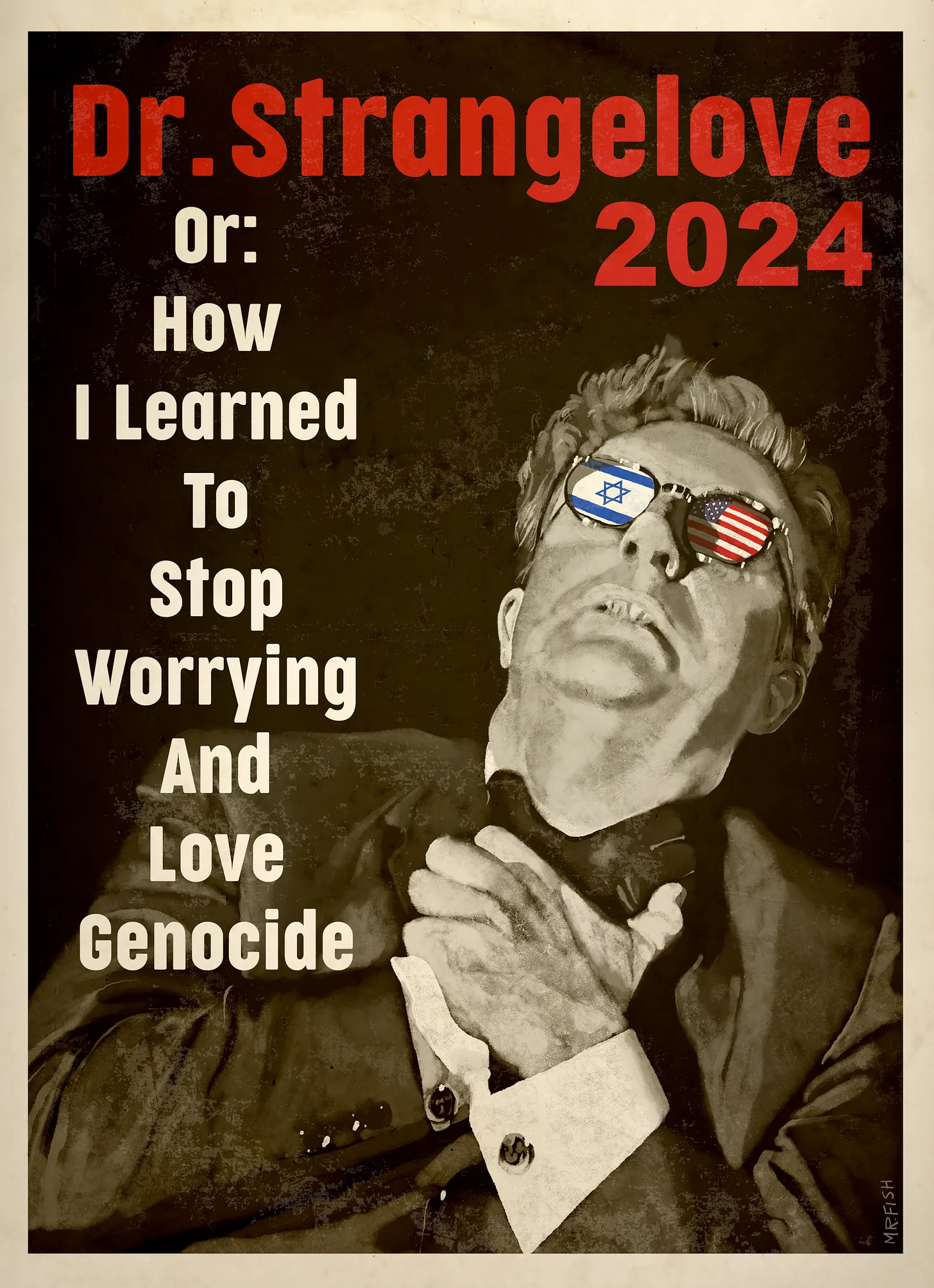
Strangelove 2024 — by Mr. Fish.
By Chris Hedges
in New York
ScheerPost
 I am sitting on a fire escape across the street from Columbia University with three organizers of the Columbia University Gaza protest. It is night. New York City Police, stationed inside and outside the gates of the campus, have placed the campus on lockdown. There are barricades blocking streets. No one, unless they live in a residence hall on campus, is allowed to enter.
I am sitting on a fire escape across the street from Columbia University with three organizers of the Columbia University Gaza protest. It is night. New York City Police, stationed inside and outside the gates of the campus, have placed the campus on lockdown. There are barricades blocking streets. No one, unless they live in a residence hall on campus, is allowed to enter.
The siege means that students cannot go to class. Students cannot go to the library. Students cannot enter the labs. Students cannot visit the university health services. Students cannot get to studios to practice. Students cannot attend lectures. Students cannot walk across the campus lawns.
The university, as during the Covid pandemic, has retreated into the world of screens where students are isolated in their rooms.
The university buildings are largely vacant. The campus pathways deserted. Columbia is a Potemkin university, a playground for corporate administrators. The president of the university — a British-Egyptian baroness who built her career at institutions such as the Bank of England, World Bank and International Monetary Fund — called in police in riot gear, with guns drawn, to clear the school’s encampment, forcibly evict students who occupied a campus hall and beat and arrest over 100 of them.
They were arrested for “criminal trespassing” on their own campus.
These administrators demand, like all who manage corporate systems of power, total obedience. Dissent. Freedom of expression. Critical thought. Moral outrage. These have no place in our corporate-indentured universities.
All systems of totalitarianism, including corporate totalitarianism, deform education into vocational training where students are taught what to think, not how to think. Only the skills and expertise demanded by the corporate state are valued.
The withering away of the humanities and transformation of major research universities into corporate and Defense Department vocational schools with their outsized emphasis on science, technology, engineering and math, illustrate this shift.
The students who disrupt the Potemkin university, who dare to think for themselves, face beatings, suspension, arrest and expulsion.
The mandarins who run Columbia and other universities, corporatists who make salaries in the hundreds of thousands of dollars, oversee academic plantations. They treat their poorly paid adjunct faculty, who often lack health insurance and benefits, like serfs.
They slavishly serve the interests of wealthy donors and corporations. They are protected by private security. They despise students, forced into onerous debt peonage for their education, who are non-conformists, who defy their fiefdoms and call out their complicity in genocide.
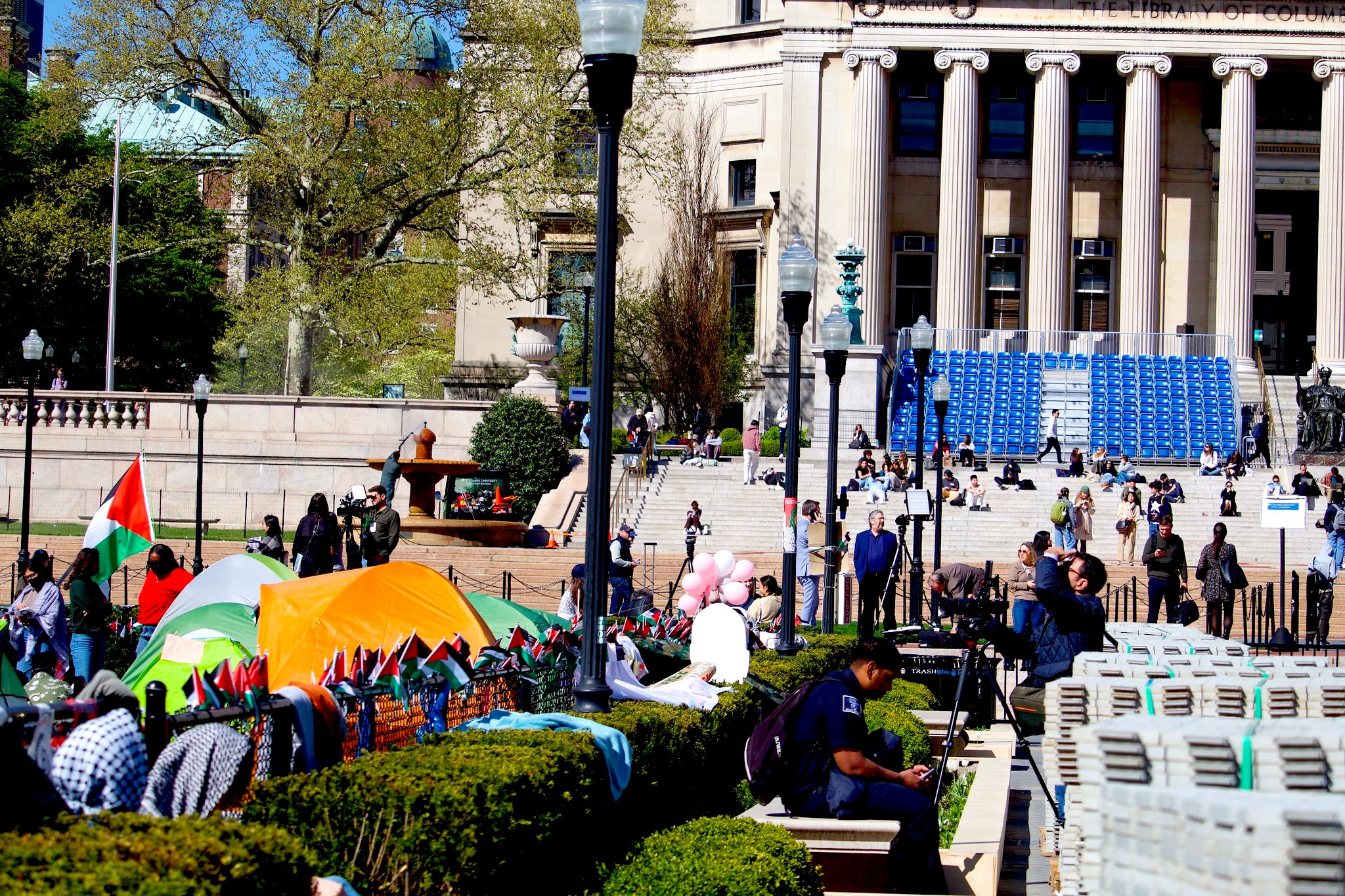
Columbia student pro-Palestine encampment on April 23, a day after a raid by the NYPD. (Pamela Drew, Flickr, CC BY-NC 2.0)
Columbia University, with an endowment of $13.64 billion, charges students nearly $90,000 a year to attend. But students are not allowed to object when their tax and tuition money funds genocide, or when their tuition payments are used to see them, along with faculty supporters, assaulted and sent to jail.
They are, as Joe Biden put it, members of “hate groups.” They are — as Senate Majority Leader Chuck Schumer said of those who occupied Hamilton Hall at Columbia — re-naming it Hind Hall, in honor of a 6-year-old Palestinian girl, Hind Rajab, who was murdered by Israeli forces after spending 12 days trapped in a car with her six dead relatives — engaged in“lawlessness.”
During the assault by dozens of police on the occupied hall, one student was knocked unconscious, several were beaten and sent to hospital and a shot was fired by a police officer inside the hall. The excess use of force is justified with the lie that there are outside infiltrators and agitators directing the protest. As the protests continue, and they will continue, this use of force will become more draconian.

Columbia campus, April 23. (Pamela Drew, Flickr, CC BY-NC 2.0)
“The university is a place of capital accumulation,” says Sara Wexler, a doctoral student in philosophy, seated with two other students on the fire escape.
“We have billion-dollar endowments that are connected to Israel and defense companies. We are being forced to confront the fact that universities aren’t democratic. You have a board of trustees and investors that are actually making the decisions. Even if students have votes saying they want divestment and the faculty want divestment, we actually don’t have any power because they can call in the NYPD.”
There is an iron determination by the ruling institutions, including the media, to shift the narrative away from the genocide in Gaza, to threats against Jewish students and antisemitism. The anger the protesters feel for journalists, especially at news organizations such as CNN and The New York Times, is intense and justified.
“I’m a German-Polish Jew,” says Wexler.
“My last name is Wexler. It’s Yiddish for money-maker, money-exchanger. No matter how many times I tell people I’m Jewish, I’m still labeled antisemitic. It’s infuriating. We are told that we need a state that is based on ethnicity in the 21st century and that’s the only way Jewish people can be safe.
But it is really for Britain and America and other imperialist states to have a presence in the Middle East. I’ve no idea why people still believe this narrative. It makes no sense to have a place for Jewish people that requires other people to suffer and die.”
I have seen this assault on universities and freedom of expression before. I saw it in Augusto Pinochet’s Chile, the military dictatorship in El Salvador, Guatemala under Rios Montt, and during my coverage of the military regimes in Argentina, Peru, Bolivia, Syria, Iraq and Algeria.
Columbia University, with its locked gates, lines of police cruisers, rows of metal barricades three and four deep, swarms of uniformed police and private security, looks no different. It looks no different because it is no different.
Welcome to our corporate dictatorship.
The cacophony of the streets of New York City punctuates our conversation. These students know what they are risking. They know what they are up against.
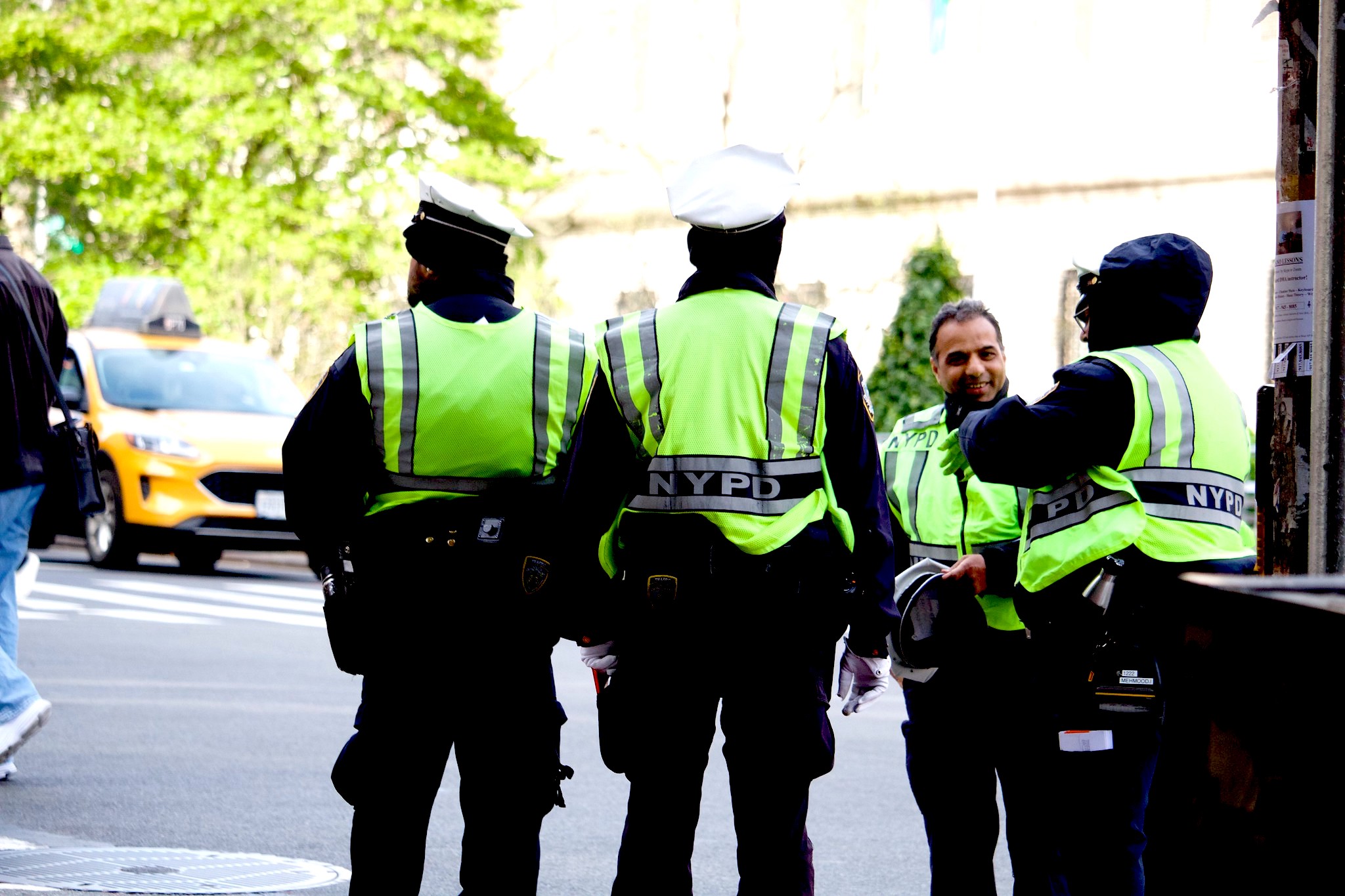
NYPD officers outside Columbia campus on April 23. (Pamela Drew, Flickr, CC BY-NC 2.0)
Student activists waited months before setting up encampments. They tried repeatedly to have their voices heard and their concerns addressed. But they were rebuffed, ignored and harassed. In November, the students presented a petition to the university calling for divestment from Israeli corporations that facilitate the genocide. No one bothered to respond.
The protesters endure constant abuse. On April 25, during Columbia’s senior boat cruise, Muslim students and those identified as supporting the protests had alcohol poured on their heads and clothes by jeering Zionists. In January, former Israeli soldiers studying at Columbia used skunk spray to assault students on the steps of Lowe Library.
The university, under heavy pressure once the attackers were identified, said they had banned the former soldiers from campus, but other students reported seeing one of the men on campus recently. When Jewish students in the encampment attempted to prepare their meals in the kosher kitchen at the Jewish Theological Seminary, they were insulted by Zionists who were in the building.
Zionist counter demonstrators have been joined on campus by the founder of the white supremist Proud Boys organization. Students have had their personal information posted on the Canary Mission and found their faces on the sides of trucks circling the campus, denouncing them as antisemites.
These attacks are replicated at other universities, including UCLA, where masked Zionists released rats and tossed fireworks into the encampment and broadcast the sound of crying children — something the Israeli army does to lure Palestinians in Gaza out of hiding to kill them.
The Zionist mob, armed with pepper and bear spray, violently attacked the protesters, as police and campus security watched passively and refused to make arrests.
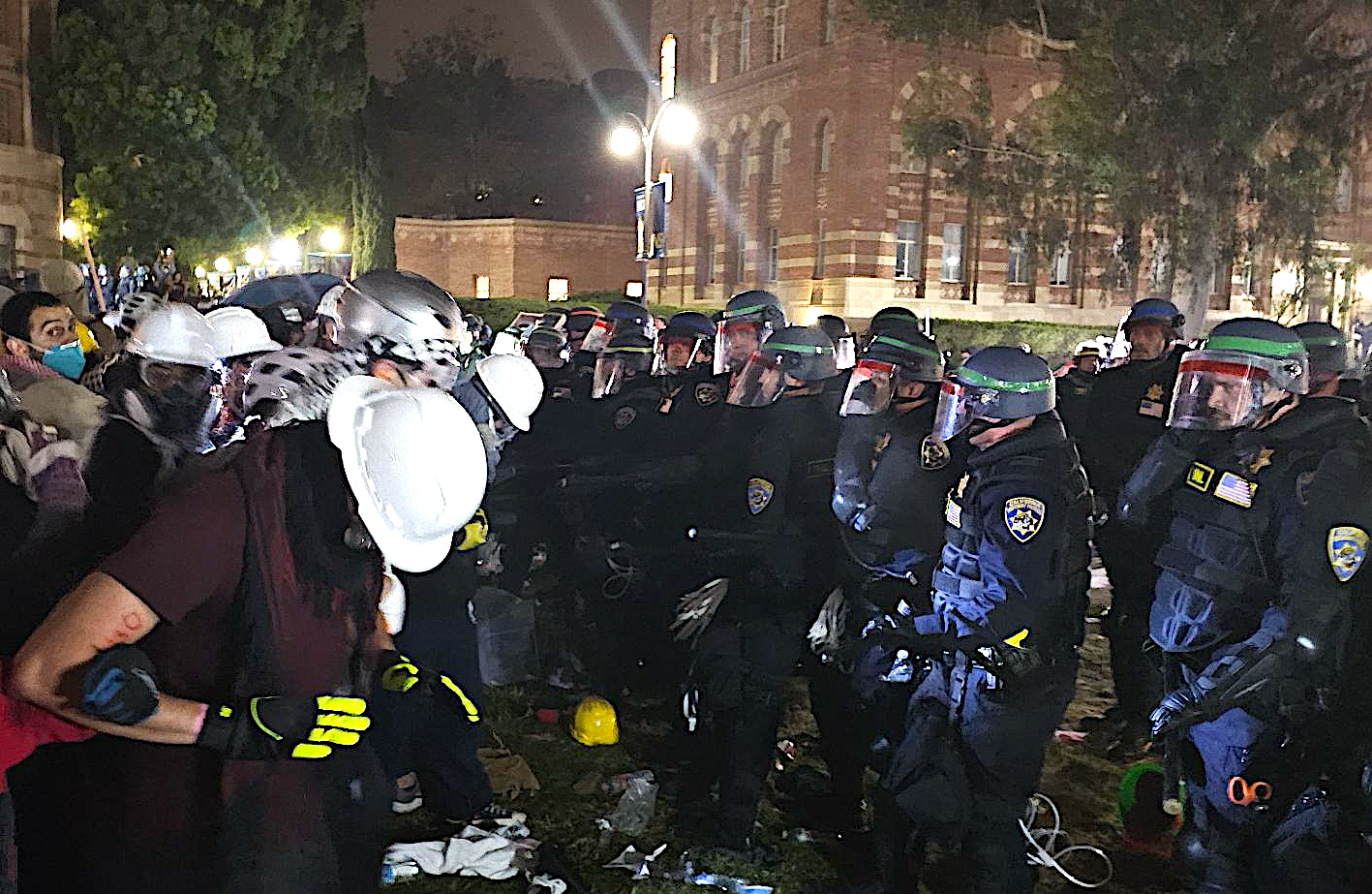
The LAPD clash with pro-Palestine student protesters at the UCLA encampment on May 1. (Media shared by people at the UCLA protest and encampment, Wikimedia Commons, CC BY 4.0)
“At the General Studies gala, which is one of the undergraduate schools that has a large population of former IDF soldiers, at least eight students wearing keffiyehs were physically and verbally harassed by students identified as ex-IDF and Israelis,” Cameron Jones, a sophomore majoring in urban studies and who is Jewish, tells me.
“Students were called ‘bitch’ and ‘whore’ in Hebrew. Some were called terrorists and told to go back to Gaza. Many of the students harassed were Arabs, some having their keffiyehs ripped off and thrown to the ground. Several students in keffiyehs were grabbed and pushed. A Jewish student wearing a keffiyeh was cursed at in Hebrew and later punched in the face. Another student was kicked.
The event ended after dozens of students sang the Israeli national anthem, some of them flipping off students wearing keffiyehs. I have been followed around campus by individuals and been cursed and had obscenities yelled at me.”
The university has refused to reprimand those who disrupted the gala, even though the individuals who carried out the assaults have been identified.
Please Donate to the
Spring Fund Drive!
Universities have hired people such as Cas Halloway, currently the chief operating officer at Columbia, who was the deputy mayor for operations under Michael Bloomberg. Holloway reportedly oversaw the police clearance of the Occupy encampment at Zuccotti Park. This is the kind of expertise universities covet.
At Columbia, student organizers, following the mass arrests and evictions from their encampment and Hind Hall, called for university-wide strikes by faculty, staff and students. Columbia has canceled its university wide commencement.
Princeton Campus
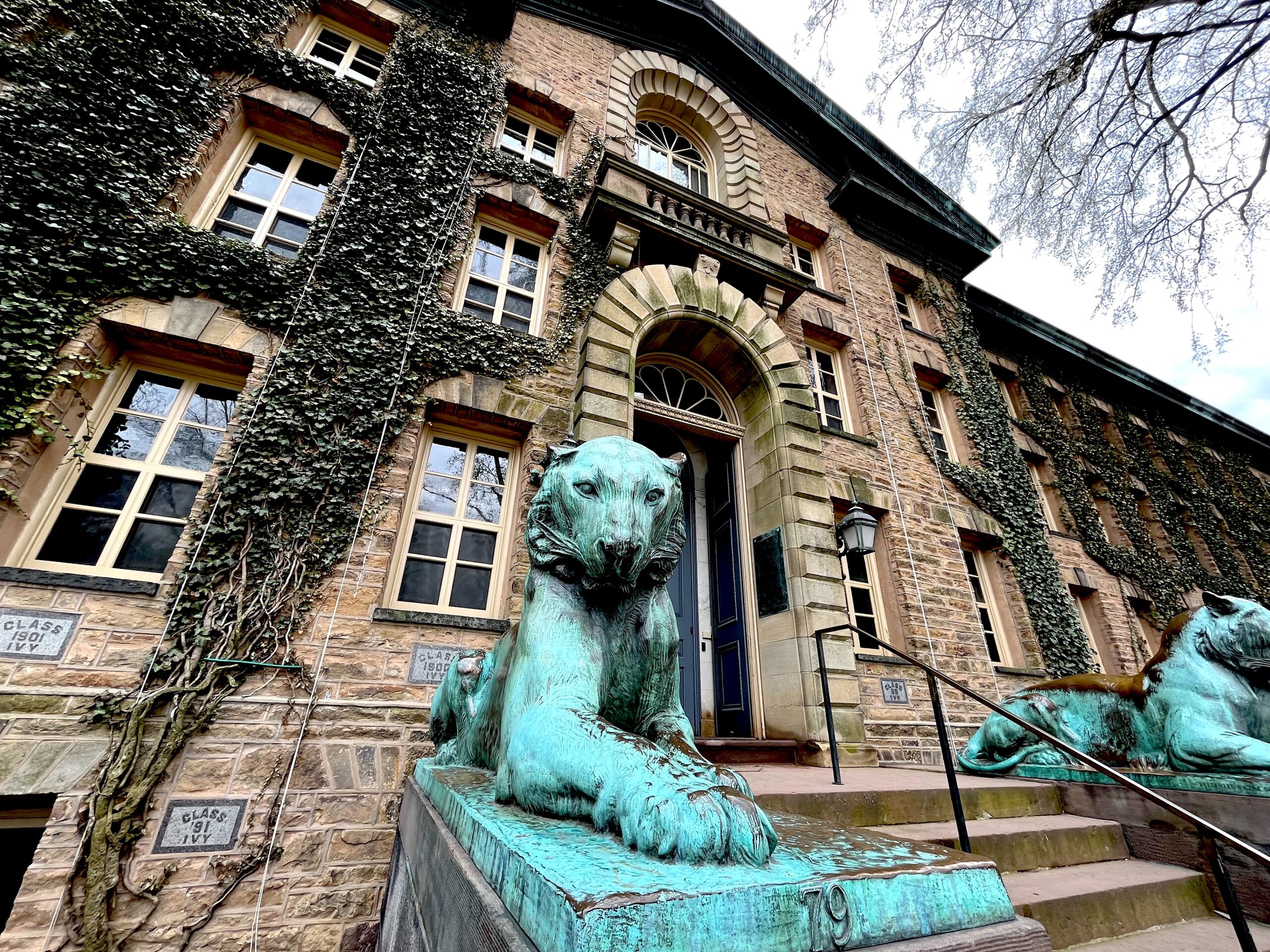
Nassau Hall, 1756, Princeton University. (Joe Lauria)
I am on the campus of Princeton University. It is after evening prayers and 17 students who have mounted a hunger strike sit together, many wrapped in blankets.
As universities escalate their crackdowns, the protesters escalate their response. Students at Princeton held rallies and walk-outs throughout October and November, which culminated in a protest at the Council of the Princeton University Community, made up of administrators, students, staff, deans and the president. They were met at each protest with a wall of silence.
Princeton students decided, following the example at Columbia, to set up a tent encampment on April 25 and issued a set of demands calling on the university to “divest and disassociate from Israel.” But when they arrived early in the morning at their staging areas, as well as the site in front of Firestone Library which they hoped to use for an encampment, they were met with dozens of campus police and Princeton town police who had been tipped off.
The students hastily occupied another location on campus, McCosh Courtyard. Two students were immediately arrested, evicted from their student housing and banned from campus. The police forced the remaining students to take down their tents.
Protesters at the encampment have been sleeping in the open, including when it rains.
In an irony not lost on the students, dotted around Princeton’s campus are massive tents set up for reunion weekend where alumni down copious amounts of alcohol and dress up in garish outfits with the school colors of orange and black. The protesters are barred from entering them.
Thirteen students at Princeton occupied Clio Hall on April 29. They, like their counterparts at Columbia, were arrested and are now barred from campus. Some 200 students surrounded Clio Hall in solidarity as the occupying students were led away by police.
As they were being processed by the police, the arrested students sang the Black spiritual Roll Jordan Roll, altering the words to “Well some say John was a baptist, some say John was a Palestinian, But I say John was a preacher of God and my bible says so too.”
The hunger strikers, who began their liquid-only diet on May 3, issued this statement:
“The Princeton Gaza Solidarity Encampment announces the initiation of a hunger strike in solidarity with the millions of Palestinians in Gaza suffering under the ongoing siege by the state of Israel. The Israeli occupation has deliberately blocked access to basic necessities to engineer a dire famine for the two million residents of Gaza.
Since the announcement on October 9 by the Israeli Defense Minister prohibiting the entry of food, fuel and electricity into the Gaza Strip, Israel has systematically obstructed and limited access to vital aid for Palestinians in Gaza, even intentionally destroying existing cropland.
On March 18, the U.N. Secretary General declared that “This is the highest number of people facing catastrophic hunger ever recorded by the integrated food security classification system.” To make bread, Gazans have been forced to use animal feed as flour. To break their fasts in Ramadan, Gazans have been forced to prepare meals of grass. 97% of Gaza’s water has been deemed undrinkable since October 2021 and they have been forced to drink dirty salt water to survive.
The consequences of this unprecedented famine created and maintained by Israel will devastate Gaza’s children for generations to come and cannot be tolerated any longer. We have begun our hunger strike to stand in solidarity with the people of Gaza. We are drawing from the tradition of Palestinian political prisoners going on salt-water-only hunger strikes in Israeli prisons since 1968.
Our hunger strike is a response to the administration’s refusal to engage with our demands for disassociation and divestment from Israel. We refuse to be silenced by the university administration’s intimidation and repression tactics. We struggle together in solidarity with the people of Palestine. We commit our bodies to their liberation. Participants in the hunger strikes will abstain from all food or drink except water until the following demands are met:
• Meet with students to discuss demands for disclosure, divestment and a full academic and cultural boycott of Israel.
• Grant complete amnesty from all criminal and disciplinary charges for participants of the peaceful sit-in.
• Reverse all campus bans and evictions of students.
The university and the world must recognize that we refuse to be complicit in genocide and will take every necessary action to change this reality. Our hunger strike, though small in comparison to the enduring suffering of the Palestinian people, symbolizes our unwavering commitment to justice and solidarity.”
Students at Princeton University in New Jersey declare a hunger strike in solidarity with the Palestinian people in Gaza amidst the ongoing Israeli genocide. pic.twitter.com/z8iwn6fup8
— Wafa News Agency – English (@WAFANewsEnglish) May 3, 2024
University President Christopher Eisgruber met with the hunger strikers — the first meeting by school administrators with protesters since Oct. 7 — but dismissed their demands.
“This is probably the most important thing I’ve done here,” says Anya Khan, a Princeton student on hunger strike whose family is from Bangladesh.
“If we’re on a scale of one to 10, this is a 10. Since the start of encampment, I have tried to become a better person. We have pillars of faith. One of them is sunnah, which is prayer. That’s a place where you train yourself to become a better person. It is linked to spirituality. That’s something I’ve been emphasizing more during my time at Princeton.
There’s another aspect of faith. Zakat. It means charity, but you can read it more generally as justice … economic justice and social justice. I’m training myself, but to what end?
This encampment is not just about trying to cultivate, to purify my heart to try to become a better person, but about trying to stand for justice and actively use these skills that I’m learning to command what I feel to be right and to forbid what I believe to be wrong, to stand up for oppressed people around the world.”
She sits with her knees tucked up in front of her. She is wearing blue sweatpants that say Looney Tunes and has an engagement ring that every so often glints in the light. She sees in Bangladesh’s history of colonialism, dispossession and genocide, the experience of Palestinians.
“So much was taken from my people,” she says.
“We haven’t had the time or the resources to recuperate from the terrible times we’ve gone through. Not only did my people go through a genocide in 1971, but we were also victims of the partition that happened in 1947 and then civil disputes between West and East Pakistan throughout the forties, the fifties and the sixties.
It makes me angry. If we weren’t colonized by the British throughout the eighteenth, nineteenth and twentieth century, and if we weren’t occupied, we would have had time to develop and create a more prosperous society. Now we’re staggering because so much was taken from us. It’s not fair.”
After last night’s attempted occupation of Clio Hall, the pro-Palestine protest at @Princeton has moved from McCosh Courtyard to Cannon Green, behind Nassau Hall. Just a few students were there this morning with signs, tarps, food, and rolled-up sleeping bags. pic.twitter.com/KCw0zQ58YA
— Princeton Alumni Weekly (@pawprinceton) April 30, 2024
The hostility of the university has radicalized the students, who see university administrators attempting to placate external pressures from wealthy donors, the weapons manufacturers and the Israel lobby, rather than deal with the internal realities of the non-violent protests and the genocide.
“The administration doesn’t care about the wellbeing, health or safety of their students,” Khan tells me.
“We have tried to get at least tents out at night. Since we are on a 24-hour liquid fast, not eating anything, our bodies are working overtime to stay resilient. Our immune systems are not as strong. Yet the university tells us we can’t pitch up tents to keep ourselves safe at night from the cold and the winds. It’s abhorrent for me. I feel a lot more physical weakness.
My headaches are worse. There is an inability to even climb up stairs now. It made me realize that for the past seven months what Gazans have been facing is a million times worse. You can’t understand their plight unless you experience that kind of starvation that they’re experiencing, although I’m not experiencing the atrocities they’re experiencing.”
The hunger strikers, while getting a lot of support on social media, have also been the targets of death threats and hateful messages from conservative influencers. “I give them 10 hours before they call DoorDash,” someone posted on X. “Why won’t they give up water, don’t they care about Palestine? Come on, give up water!” another post read.
“Can they hold their breath too? Asking for a friend,” another read. “OK so I hear there’s going to be a bunch of barbecues at Princeton this weekend, let’s bring out a bunch of pork products too to show these Muslims!” someone posted.
On campus the tiny groups of counter protesters, many from the ultra orthodox Chabad House, jeer at the protesters, shouting “Jihadists!” or “I like your terrorist headscarf!”
“It is horrifying to see thousands upon thousands of people wish for our deaths and hope that we starve and die,” Khan says softly.
“In the press release video, I wore a mask. One of the funnier comments I got was, ‘Wow, I bet that chick on the right has buck-teeth behind that mask.’ It’s ridiculous. Another read, ‘I bet that chick on the right used her Dyson Supersonic before coming to the press release.’ The Dyson Supersonic is a really expensive hair dryer. Honestly, the only thing I got from that was that my hair looked good, so thank you!”
David Chmielewski, a senior whose parents are Polish and who had family interned in the Nazi death camps, is a Muslim convert. His visits to the concentration camps in Poland, including Auschwitz, made him acutely aware of the capacity for human evil.
He sees this evil in the genocide in Gaza. He sees the same indifference and support that characterized Nazi Germany. “Never again,” he says, means never again for everyone.

On April 25, hundreds of students from Temple, Drexel and UPenn marched in solidarity with Palestine to UPenn’s campus, where professors walked out of classes. Students also set up tents in solidarity with the Columbia University student encampment. (Joe Piette, Flickr, CC BY-NC-SA 2.0)
“Since the genocide, the university has failed to reach out to Arab students, to Muslim students and to Palestinian students to offer support,” he tells me. “The university claims it is committed to diversity, equity and inclusion, but we don’t feel we belong here.”
“We’re told in our Islamic tradition by our prophets that when one part of the ummah, the nation of believers, feels pain, then we all feel pain,” he says.
“That has to be an important motivation for us. But the second part is that Islam gives us an obligation to strive for justice regardless of who we’re striving on behalf of. There are plenty of Palestinians who aren’t Muslim, but we’re fighting for the liberation of all Palestinians.
Muslims stand up for issues that aren’t specifically Muslim issues. There were Muslims who were involved in the struggle against apartheid in South Africa. There were Muslims involved in the civil rights movement. We draw inspiration from them.”
“This is a beautiful interfaith struggle,” he says.
“Yesterday, we set up a tarp where we were praying. We had people doing group Quran recitations. On the same tarp, Jewish students had their Shabbat service. On Sunday, we had Christian services at the encampment. We are trying to give a vision of the world that we want to build, a world after apartheid.
We’re not just responding to Israeli apartheid, we’re trying to build our own vision of what a society would look like. That’s what you see when you have people doing Quran recitations or reading Shabbat services on the same tarp, that’s the kind of world we want to build.”
“We’ve been portrayed as causing people to feel unsafe,” he says.
“We’ve been perceived as presenting a threat. Part of the motivation for the hunger strike is making clear that we’re not the people making anyone unsafe. The university is making us unsafe. They’re unwilling to meet with us and we’re willing to starve ourselves. Who’s causing the un-safety?
There is a hypocrisy about how we’re being portrayed. We’re being portrayed as violent when it’s the universities who are calling police on peaceful protesters. We’re being portrayed as disrupting everything around us, but what we’re drawing on are traditions fundamental to American political culture.
We’re drawing on traditions of sit-ins, hunger strikes and peaceful encampments. Palestinian political prisoners have carried out hunger strikes for decades. The hunger strike goes back to de-colonial struggles before that, to India, to Ireland, to the struggle against apartheid in South Africa.”
“Palestinian liberation is the cause of human liberation,” he goes on.
“Palestine is the most obvious example in the world today, other than the United States, of settler-colonialism. The struggle against Zionist occupation is viewed accurately by Zionists both within the United States and Israel, as sort of the last dying gasp of imperialism. They’re trying to hold onto it.
That’s why it’s scary. The liberation of Palestine would mean a radically different world, a world that moves past exploitation and injustice. That’s why so many people who aren’t Palestinian and aren’t Arab and aren’t Muslim are so invested in this struggle. They see its significance.”
Please Donate to the
Spring Fund Drive!
“In quantum mechanics there’s the idea of non-locality,” says Areeq Hasan, a senior who is going to do a PhD in applied physics next year at Stanford, who is also part of the hunger strike.
“Even though I’m miles and miles away from the people in Palestine, I feel deeply entangled with them in the same way that the electrons that I work with in my lab are entangled. As David said, this idea that the community of believers is one body and if one part of the body is in pain, all of it pains, it is our responsibility to strive to alleviate that pain.
If we take a step back and look at this composite system, it’s evolving in perfect unitary, even though we don’t understand it because we only have access to one small piece of it. There is deep underlying justice that maybe we don’t recognize, but that exists when we look at the plight of the Palestinian people.”
There’s a tradition associated with the prophet,” he says.
“When you’ve seen an injustice occur you should try to change it with your hands. If you can’t change it with your hands then you should try to adjust it with your tongue. You should speak out about it. If you can’t do that, you should at least feel the injustice in your heart.
This hunger strike, this encampment, everything we’re doing here as students, is my way of trying to realize that, trying to implement that in my life.”
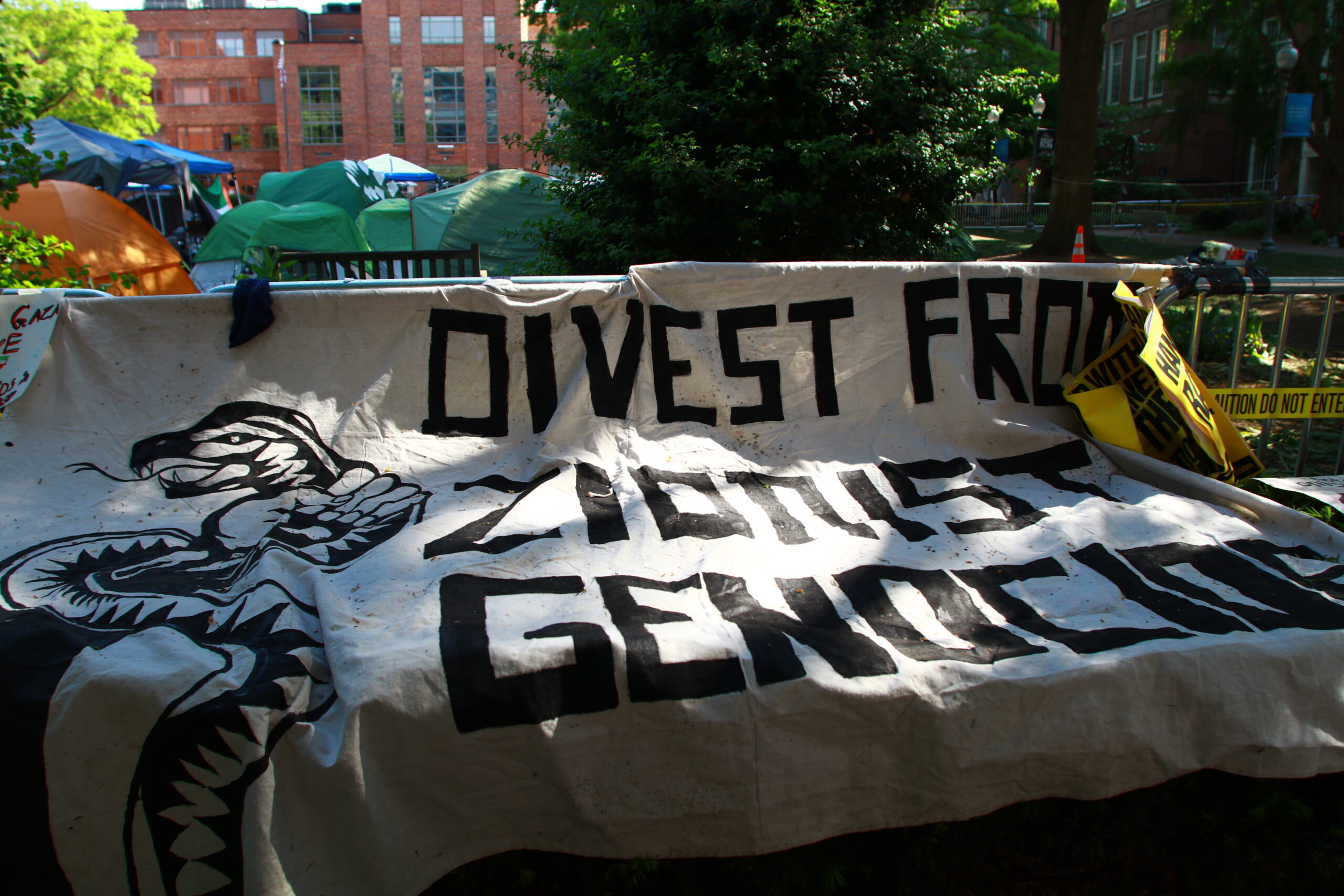
Sign reading, “Divest from zionist genocide” at George Washington University in Washington on April 28. (Fuzheado, Wikimedia Commons, Public domain)
Spend time with the students in the protests and you hear stories of revelations, epiphanies. In the lexicon of Christianity, these are called moments of grace. These experiences, these moments of grace, are the unseen engine of the protest movements.
When Oscar Lloyd, a junior at Columbia studying cognitive science and philosophy, was about 8-years-old, he and his family visited the Pine Ridge Reservation in South Dakota.
“I saw the vast distinction between the huge memorial at the Battle of the Little Bighorn compared to the small wooden sign at the massacre at Wounded Knee,” he says, comparing the numerous monuments celebrating the 1876 defeat of the U.S. 7th Cavalry at the Little Big Horn to the massacre of 250 to 300 Native Americans, half of whom were women and children, in 1890 at Wounded Knee.
“I was shocked that there can be two sides to history, that one side can be told and the other can be completely forgotten. This is the story of Palestine.”
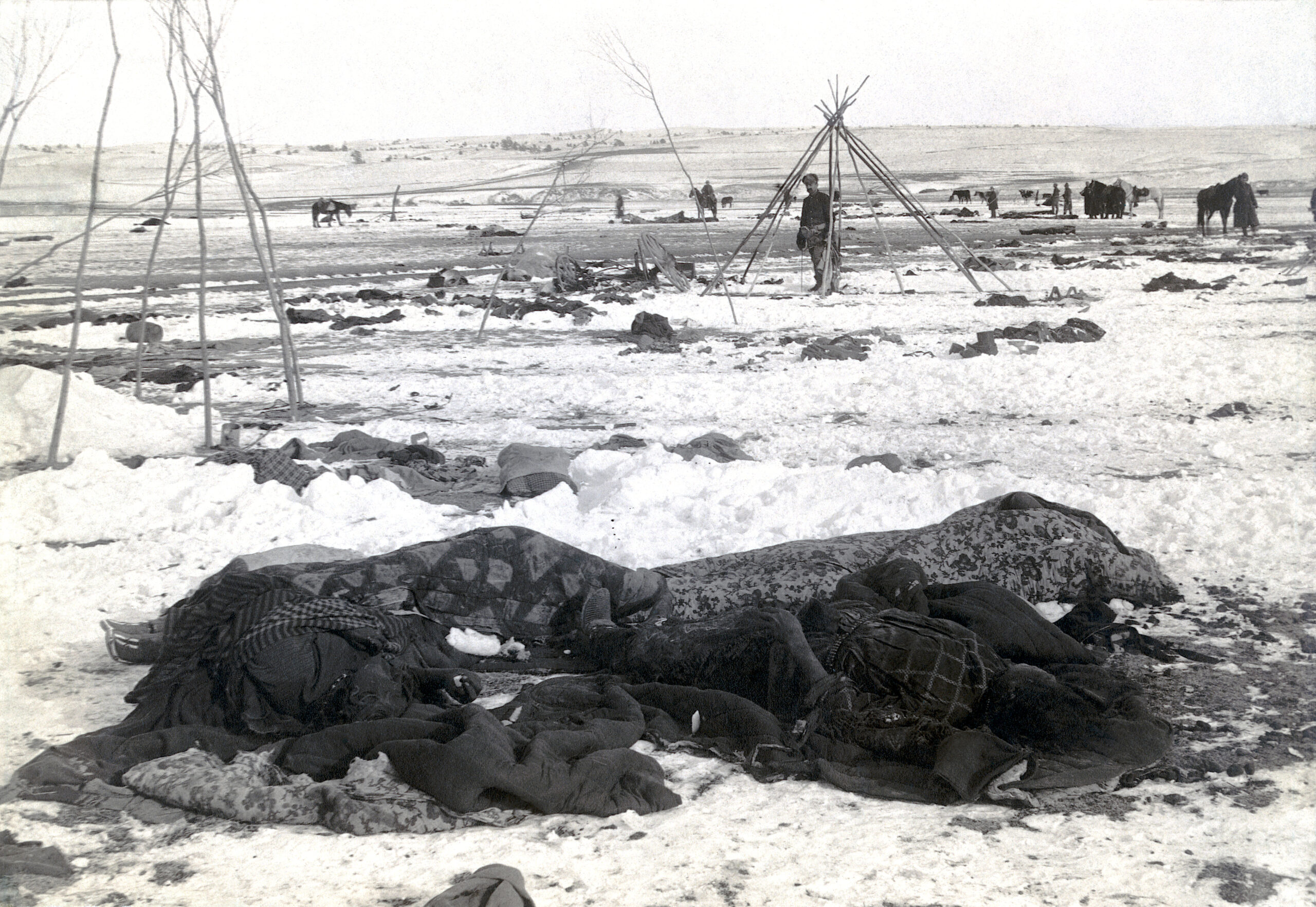
The scene three weeks after the U.S. massacre on Dec. 29, 1890, at Wounded Knee, with the bodies of four Lakota Sioux wrapped in blankets in the foreground. (Trager & Kuhn, Chadron, Nebr., Library of Congress, Wikimedia Commons, Public domain)
Sara Ryave, a graduate student at Princeton, spent a year in Israel studying at the Pardes Institute of Jewish Studies, a non-denominational yeshiva. She came face to face with apartheid. She is banned from campus after occupying Clio Hall.
“It was during that year that I saw things that I will never forget,” she said.
“I spent time in the West Bank and with communities in the south Hebron Hills. I saw the daily realities of apartheid. If you don’t look for them, you don’t notice them. But once you do, if you want to, it’s clear. That predisposed me to this. I saw people living under police and IDF military threats every single day, whose lives are made unbearable by settlers.”
When Hasan was in fourth grade, he remembers his mother weeping uncontrollably on the 27th night during Ramadan, an especially holy day known as The Night of Power. On this night, prayers are traditionally answered.
“I have a very vivid memory of standing in prayer at night next to my mother,” he says.
“My mother was weeping. I’d never seen her cry so much in my life. I remember that so vividly. I asked her why she was crying. She told me that she was crying because of all of the people that were suffering around the world. And among them, I can imagine she was bringing to heart the people in Palestine.
At that point in my life, I didn’t understand systems of oppression. But what I did understand was that I’d never seen my mother in such pain before. I didn’t want her to be in that kind of pain. My sister and I, seeing our mother in so much pain, started crying too. The emotions were so strong that night. I don’t think I’ve ever cried like that in my life.
That was the first time I had a consciousness of suffering in the world, specifically systems of oppression, though I didn’t really understand the various dimensions of it until much later on. That’s when my heart established a connection to the plight of the Palestinian people.”
Helen Wainaina, a doctoral student in English who occupied Clio Hall at Princeton and is barred from campus, was born in South Africa. She lived in Tanzania until she was 10-years-old and then moved with her family to Houston.
“I think of my parents and their journeys in Africa and eventually leaving the African continent,” she says.
“I’m conflicted that they ended up in the U.S. If things had turned out differently during the post-colonial movements, they would not have moved. We would have been able to live, grow up and study where we were. I’ve always felt that that was a profound injustice.
I’m grateful that my parents did everything they could to get us here, but I remember when I got my citizenship, I was very angry. I had no say. I wish the world was oriented differently, that we didn’t need to come here, that the post-colonial dreams of people who worked on those movements actually materialized.”
The protest movements – which have spread around the globe – are not built around the single issue of the apartheid state in Israel or its genocide against Palestinians. They are built around the awareness that the old world order, the one of settler colonialism, western imperialism and militarism used by the countries in the Global North to dominate the Global South, must end.
They decry the hoarding of natural resources and wealth by industrial nations in a world of diminishing returns. These protests are built around a vision of a world of equality, dignity and independence. This vision, and the commitment to it, will make this movement not only hard to defeat, but presages a wider struggle beyond the genocide in Gaza.
The genocide has awakened a sleeping giant. Let us pray the giant prevails.
Chris Hedges is a Pulitzer Prize–winning journalist who was a foreign correspondent for 15 years for The New York Times, where he served as the Middle East bureau chief and Balkan bureau chief for the paper. He previously worked overseas for The Dallas Morning News, The Christian Science Monitor and NPR. He is the host of show “The Chris Hedges Report.”
NOTE TO READERS: There is now no way left for me to continue to write a weekly column for ScheerPost and produce my weekly television show without your help. The walls are closing in, with startling rapidity, on independent journalism, with the elites, including the Democratic Party elites, clamoring for more and more censorship. Please, if you can, sign up at chrishedges.substack.com so I can continue to post my Monday column on ScheerPost and produce my weekly television show, “The Chris Hedges Report.”
This column is from Scheerpost, for which Chris Hedges writes a regular column. Click here to sign up for email alerts.
The views expressed are solely those of the author and may or may not reflect those of Consortium News.
Please Donate to the
Spring Fund Drive!



The proverb, “with yourself use your head; with others, use your heart,” ‘LIVES,’
………. “Spend time with the students in the protests and you hear stories of revelations, epiphanies. In the lexicon of Christianity, these are called moments of grace. These experiences, these moments of grace, are the unseen engine of the protest movements.” CHRIS HEDGES
Concluding, “Virtue Is Power!!!”
Student protests “for the sake of conscience” (Romans 13.5), may be
something like early church father, Tertullian’s interpretation of the
slaughter of early Christians being: “the blood of martyrs the seed of
the church” (c. 2nd century AD).
Genocide of Gazans and perhaps all Palestinians (Ramzy Baroud),
as a divinely purposed world historical fate, to bring about a Christian
ummah for the human world to combat the deepening totalitarian
military-industrial complex oppression of humanity and its willful
destruction of our earth’s creation.
And all of Christianity should be in lockstep with our Gazan brothers, sisters, and children being martyred daily on the altar of the hatred of humanity, fueled by military might.
Yes John Z. I share your frustration at the lack of established
Christian churches not protesting vehemently for Palestinians.
Kind of what I’m suggesting is that maybe a different sort
of church is in the offing. The Holy Spirit is not contained
or determined by human actions, especially by hypocrites.
Oh, Ray Peterson, without a doubt, “a different sort of church,” arrived! Yesterday.
On a weekly basis, Leaders around the world submit application to join. An Application “Under Consideration” is a gift; hence, it’s called the “present,” i.e., “BRICS,” Unity in Multiplicity, “e pluribus unum “out of many, one.”
……… “There’s a whole new world being formed.” DENNIS KUCINICH, “We’re beating ourselves.”
“This whole thing is blowing up in the face of the West. We forced Russia to pivot to Asia, as well as Brazil, India, China, South Africa and Saudi Arabia. There’s a whole new world being formed.”
“The catalyst of it is the misjudgment that occurred about Ukraine and the effort to try to control Ukraine. An engineered coup, in 2014. From 2014-2021, fourteen thousand (14K), by most estimates, Russian speaking Ukrainians, were killed. Most Americans have no idea.” DENNIS KUCINICH @ “How the War Machine took over the Democrats.” The Chris Hedges Report 12.16.2022 @ hxxps://m.youtube.com/watch?v=dPd7DmmIe0o
“Onward & Upwards!” Ciao
Laurence Shoupp writes on monthlyreview….2024 05 01
Is the US-Is violence in Gasa the first exprriment in considrring all of humanity valueless and disposable?
Comprehensive and referenced.
“These administrators demand, like all who manage corporate systems of power, total obedience. Dissent. Freedom of expression. Critical thought. Moral outrage. These have no place in our corporate-indentured universities.”
Emory Inc. President Gregory Fenves crashed head-on into student moral outrage and he still denies calling the cops on his own staff and students. @ Emory Inc. protest coverage on Atlanta News First: over 204k views, 5379 comments :
hxxps://www.youtube.com/watch?v=L5t5ldOXvwQ
The majority of the 5380 comments SUPPORT beating-up students and professors! The pro-israel hate generated in the local community around Emory University is stunning.?The majority of the comments slammed the professors and students violently beat down and arrested. Emory refuses to drop the charges against its own professors and students. Both Faculty and Students have voted ‘no confidence’ on Pres.Gregory Fenves. Emory has cowardly moved their graduation ceremony to GasSouth Arena, a parking nightmare generic corporate ‘safe place’ in Duluth, GA – Gwinnett County. Many professors agree that Emory needs a new president with a humanities background. Both Pres. Fenves and several past presidents were engineer majors.
Atlanta is buried in zionism and jewish supremacy. Emory has $11 billion endowment and is Atlanta’s largest employer with over 35,000+ employees.
Emory owns a coca-cola bottling plant in Palestine.; I wonder if it’s still standing?
Three cheers for Chris Hedges!
To see what America has done to other races and beliefs in the world is a tragedy. But what is even worse is to see what America has done to Palestine. A faraway land now controlled by the Neo Nazis of Tel Aviv.
“What hath God wrought,” is an insane question as it ‘s perfectly clear that both the U.S. and Israel have becomes the ruination of themselves and our planet.
We are now getting to the heart of the matter. It is the ruling class. It makes little sense to me why this is chosen as their last battleground. I mean, we could just give VISAs to the 7.5 million Israelis there and be done with it. But we want that launch pad, even though the oil fields are turning to other places. Just bad foreign policy, as usual.
Thank you, Chris. These are tears of sadness for Gaza, but also tears of gratitude and solidarity and love. These students are absolutely amazing. May we all build a better world together, insha’Allah.
Brutal account of the bravery of the students! The pro-israeli thugs belong in cages.
t
The question really stems from the title: does amerika have a conscience? I would answer NO, at least at govt level. And the us govt level conscience is the Israeli level, absolutely no conscience!
As we have seen over and over, Israel and its proxy orgs in the us completely dominate us govt and infrastructure.
Great journalism by Chris Hedges. He gives the protesters what the media doesn’t want them to have: their own voices, loud and clear. What these prestigious universities are really telling these students is this: you are renting a space in a high-rise sterility factory. Our rules apply to your life inside this factory to the utmost degree. Your ideas, your desires for justice don’t matter unless they serve the purposes of this institution and its billionaire benefactors – yes, an institution we have simply taken over after a long, credible history which had nothing at all to do with us. All of society is but a destroy and hold operation. Individuals have no meaning inside such a society unless they prove themselves useful to its increasing power. Anyone else can be sent to the provinces or forgotten, whichever is easiest. The corporations we work for will continue to poison the world, and the best medical techniques required to survive the damage to humanity which they cause will not be available to you unless you are complicit in our crimes. All your residual cultural, religious, societal beliefs will be used by us to deceive you into thinking that a rational civilization is still in control of the future. Instead, it will only be us in control, counting our profits like the graves now mounting at the periphery of your quaint vision of the future.
I think you have these horrible creatures serving power pegged. May I quote you?
Absolutely! And thanks!